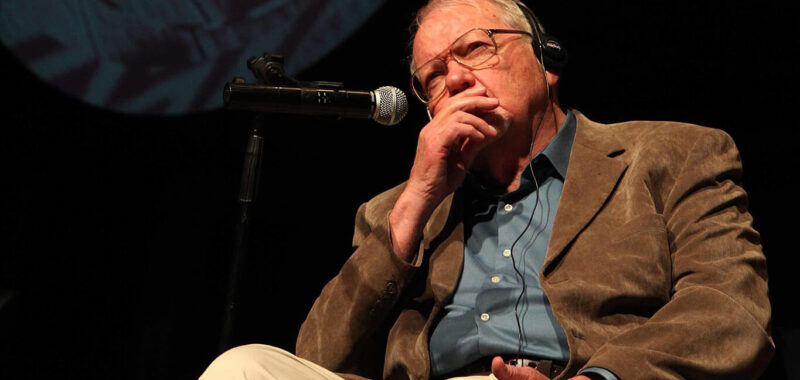Philosopher Fredric Jameson died on September 22 in Durham, North Carolina. He was 90 years old. News of Jameson’s passing was shared by London Review of Books.
Since 1985, Jameson has been professor of comparative and romantic literature at Duke University. Postmodernism, or, The Cultural Logic of Late Capitalism was arguably Jameson’s best known book where, in 1991, he referenced Robert Venturi, Charles Moore, Michael Graves, Frank Gehry, John Portman and other architects to explore the schism between high modernism and postmodernism; and that schism’s cultural, political, and economic ramifications more broadly.
“Architecture is, however, of all the arts that is closest constitutively to the economic,” Jameson famously postulated, “with which, in the form of commissions and land values, it has a virtually unmediated relationship: it will therefore not be surprising to find the extraordinary flowering of the new postmodern architecture grounded in the patronage of multinational business, whose expansion and development is strictly contemporaneous with it.”
Other majorly important texts for architects penned by Jameson include The Brick and the Balloon: Architecture, Idealism and Land Speculation; Architecture and the Critique of Ideology; Future City; Space Wars; and others. Duke University Press was once called “the house that Fred built,” a world-renowned publisher that produced hundreds of titles under Jameson’s tutelage.

In 1934, Jameson was born in Cleveland, Ohio. He moved to New Jersey at a young age. He earned a Bachelor’s diploma at Haverford College and went on to receive a PhD from Yale University, where he graduated in 1959. He studied under Erich Auerbach, a German philosopher and pioneer in the field of comparative literature.
Two years after finishing his PhD at Yale, in 1961, Jameson published his first book, Sartre: The Origins of a Style. Douglas Kellner, a UCLA professor, noted that Jameson’s first book was devoid of Marxist theory. However it was three paradigmatic shifts—the Cuban Revolution, the anti-Vietnam War movement, and rise of the New Left—that made Jameson interested in Marxist literature. Ernst Bloch, Theodor Adorno, Walter Benjamin, Herbert Marcuse, and Georg Lukacs became some of his biggest influences.
Jameson began teaching at the University of California at San Diego in 1965. Important texts followed including The Prison-House of Language (1972); Fables of Aggression: Wyndham Lewis, the Modernist as Fascist (1979); and The Political Unconscious: Narrative as a Socially Symbolic Act (1981). Hal Foster first published a lecture by Jameson, “Postmodernism and Consumer Society,” in a 1983 anthology, The Anti-Aesthetic, which formed the basis of Postmodernism, or, The Cultural Logic of Late Capitalism, published eight years later.
In 1985, Jameson founded Duke University’s literature program, where he taught until his death. He was elevated to fellow at the American Academy of Arts and Sciences that same year. Jameson received a number of accolades, including an honorary doctorate from the University of Chicago in 2001. The Norwegian Ministry of Education and Research awarded Jameson the highly prestigious Holberg International Memorial Prize in 2008. In 2019, Jameson donated his papers to University of California at Irvine.
Jameson continued published books and articles well into his late-80s. Inventions of a Present: The Novel in its Crisis of Globalization was published in May. The Years of Theory: Lectures on Modern French Thought was one of his last book projects, and is set for release this October.
Terry Eagleton, philosopher and literary critic, will review The Years of Theory in London Review of Books, a text that will double as an obituary about Jameson.

